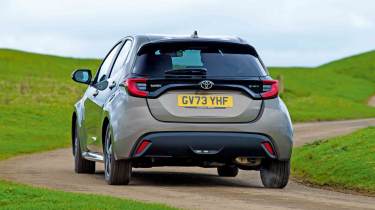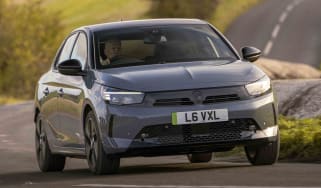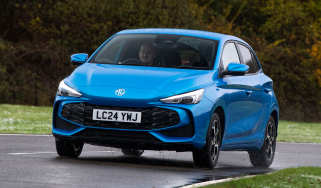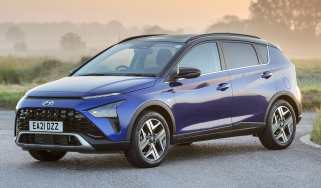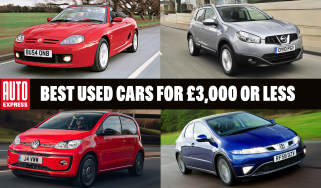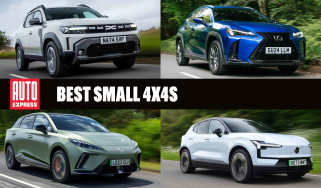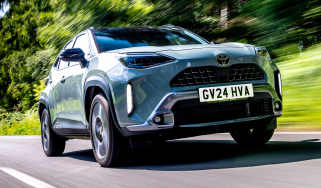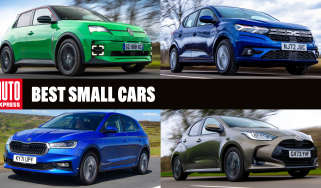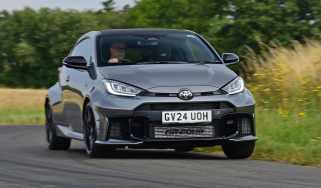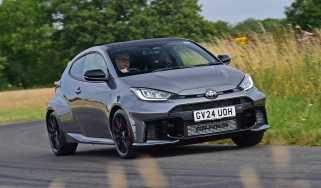Toyota Yaris review
An efficient hybrid powertrain and plenty of standard kit make the Toyota Yaris a key contender in the supermini segment

The latest Toyota Yaris supermini is one of the best cars of its type in our view, helped by its stylish design, good fuel economy and plenty of kit thrown-in as standard.
The fourth-generation Yaris is a great performer around town, and certainly won’t be caught out on motorway stretches. However, despite all this and its excellent safety record, high prices, limited room for people in the back, a small boot, plus a dull interior could prove to be stumbling blocks for some.
About the Toyota Yaris
Even without considering the marvellous GR Yaris hot hatch that holds so much appeal for keen drivers, the regular version of Toyota’s Yaris supermini still deserves to be lauded as the best version to date. As a pioneer of hybrid technology, the Japanese brand has concentrated on delivering an increasingly green range. To this end, while most car makers continue to offer petrol and diesel vehicles in their line-ups, the Yaris now features a single petrol-hybrid powertrain.
Traditional rivals such as the Vauxhall Corsa, Peugeot 208, Hyundai i20 and Volkswagen Polo provide myriad engine and trim combinations, but anyone considering the Yaris might also be drawn specifically towards the Renault Clio E-Tech or Honda Jazz, which feature similar fuel-sipping hybrid set-ups. They may even consider the Mazda 2 Hybrid, which would be ironic, because this is a Yaris, just with Mazda badging.
In an ultra-competitive supermini market, the five-door Yaris (the winner of our 2022 Affordable Hybrid Car of the Year award) keeps things simple. The engine range is based around a three-cylinder, 1.5-litre petrol hybrid delivering either 114bhp or 128bhp. Considering that we’ve always found the 114bhp model to provide more than enough power to make it a capable performer around town, we think the latter (which is only available in pricier trims) will only really be necessary if you do most of your driving on faster roads.
Used - available now

2025 Toyota
Yaris
27,186 milesAutomaticPetrol1.5L
Cash £15,437
2025 Toyota
Yaris
19,964 milesAutomaticPetrol1.5L
Cash £16,000
2020 Toyota
Yaris
38,351 milesManualPetrol1.0L
Cash £10,087
2021 Toyota
Yaris
16,585 milesAutomaticPetrol1.5L
Cash £16,887Toyota claims the hybrid model’s bigger battery will help it function in pure electric mode for around 80 per cent of the time while on regular urban journeys, and it can be driven at up to 80mph before the petrol engine imperceptibly chips in to support smooth progress. It has a dedicated EV-only mode, but with only 0.7kWh of battery capacity, don’t expect it to go very far, or all that fast, on volts alone.
The dimensions of this Yaris have shrunk compared to the previous model, with a slightly reduced overall length and a lower roofline than before. The effect is a sporty, more muscular look, with the metallic and pearlescent bi-tone paint finishes particularly striking.
Standard equipment for the Yaris is comprehensive, with the entry Icon trim including 16-inch alloy wheels, automatic headlights and wipers, adaptive cruise control, air-con, a 7.0-inch infotainment touchscreen and Android Auto and Apple CarPlay smartphone connectivity. Mid-spec Design adds extra kit such as LED headlights, privacy glass and a bigger infotainment screen, while GR Sport and Excel specifications sit at the top of the price list.
Starting from just under £23,000 at the time of writing, the Yaris is a little more expensive than some of its combustion-engined rivals. However, it sits between the electrified Renault Clio E-Tech and the pricier Honda Jazz in terms of cost.
Used and nearly new
Ever since Toyota arrived in the UK more than half a century ago, it’s offered cars that focus on reliability rather than excitement. It’s a strategy that’s served the firm very well, with buyers returning time after time, safe in the knowledge that their car is unlikely to let them down.
That’s certainly true of the Yaris, the first generation of which appeared in 1999. With light controls and an easy driving experience, this supermini provided quality and economy with a healthy dose of practicality. It’s a formula Toyota has stuck with right up to the latest Mk4 car.
Toyota Yaris history
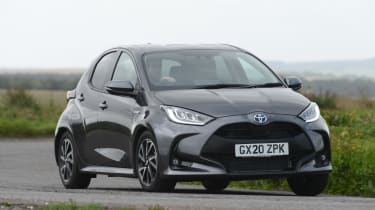
Toyota Yaris Mk4: 2020-
There are plenty of used MK4 Yaris models available on the used market – far more than the Mazda 2 Hybrid, which shares the same platform and engine. The two are roughly the same price, so the choice between them depends more upon whether you’re closer to a Mazda or Toyota dealer, or whether you want the longer warranty (provided you regularly service it at a dealer) of the Yaris. The Yaris is a dependable car, but the current Honda Jazz features a little higher up the list, both in terms of reliability and overall ranking.
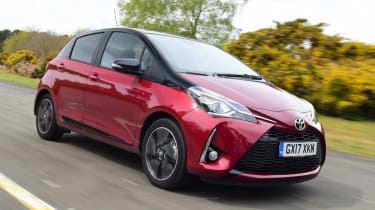
Toyota Yaris Mk3: 2011-2020
The Yaris Mk3 enjoyed nearly a decade of production, during which time it cemented a reputation for reliability and efficiency. Key to this was the availability of a Yaris Hybrid, which delivered diesel-like economy in the city. There was even a diesel option, which is a great used buy for anyone searching for a supermini to take on long trips. Toyota’s five-year/100,000-mile warranty should still cover late versions of the Yaris Mk3. Read our full Mk3 Toyota Yaris buyer’s guide here…
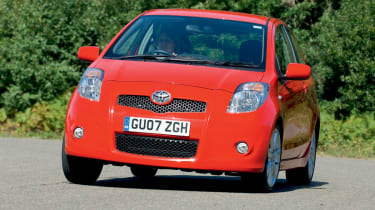
Toyota Yaris Mk2: 2006-2011
Launched in 2006, the Yaris Mk2 picked up where the old Yaris left off by offering a compelling blend of efficiency, reliability and practicality. Supermini buyers in search of fun should look elsewhere, because the Yaris Mk2 is unexciting to drive, especially if you opt for the entry-level 1.0 three-cylinder petrol engine.
Older Toyota Yaris models
Following its production debut at the 1998 Paris Motor Show, the Toyota Yaris (Vitz in its domestic market) went on sale in 1999. Available as a three- or five-door hatchback, the Yaris replaced the Starlet and featured a central instrument panel and best-in-class safety and environmental credentials. The award-winning 1.0-litre 16-valve petrol engine delivered the performance of a 1.4-litre engine and was named International Engine of the Year in 1999.
Frequently Asked Questions
The Toyota Yaris is very safe, well-equipped, and highly economical. However, there are better family-oriented superminis offering more passenger space, and the Yaris isn’t a barrel of laughs to drive. That honour is reserved for the (impossible to order) GR Yaris hot hatch.

